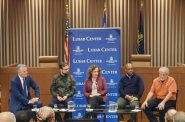Zero Locus
A small startup company provides “Big Data” analysis in Milwaukee.
Data analytics is becoming big business, and a new Milwaukee startup in this field, Zero Locus, hopes it can become an important player in this field. Data analytics interprets data into useful information in fields such as market research and information technology. A recent report by McKinsey & Company predicted the field of data analytics could add as much as $325 billion to the economy by 2020.
The founders of Zero Locus, Art Mellor and Tony Falcone, are two MIT engineers who strive to create an analytics product which everyone can use. They received funding from Gener8tor and American Family Insurance to fund their new company, located in the Third Ward, which they started in January 2013. Gener8tor, sponsored by American Family Insurance, provides capital, advice and mentorship to early-stage entrepreneurs.
In the long-run, Mellor and Falcone hope to turn their startup into a thriving enterprise or let another business take it over. We spoke to Mellor about the company.
Why did you open this business, why in Milwaukee and why in this neighborhood?
I grew up in Milwaukee and moved away to Boston for college where I remained for most of my life. I moved back here 2 years ago. I have spent my career in startups and sought out the startup community when I moved back. Through involvement with Gener8tor, I was introduced to a potential customer with a product need. That customer and Gener8tor agreed to seed fund a company if I agreed to start it. The neighborhood was chosen because Gener8tor initially provided free space in the Third Ward for me and I liked it there.
I was looking for work after having moved back to Milwaukee. In Boston I had done a number of things, including starting software startups and a nonprofit. American Family Insurance and Gener8tor funded Zero Locus because they liked the idea of us forming a product under Data Analytics. They were the funder and investor and potential customer. Our company was formed in January 2013 but we didn’t actually start working on the product until August.
What products and services do you offer?
We are developing software to do predictive analytics on large datasets (“Big Data”). We process data sets to gain useful information. Predictive analytics is a class of data analytics involved with gaining knowledge about unobserved events from related observed events. For example, a retailer might want to know your demographics based on the market basket you are purchasing so they can provide an appropriate coupon to get you back in the store.
How do you plan to make it successful and beat competitors?
Our CTO, Tony, has a very strong background in this area of mathematics as well as being a stellar software engineer. We have experience solving complex problems in many fields and extensive startup experience. The field is relatively new (as far as being products directed at businesses rather than academics) so the competition is still nascent.
What’s the biggest challenge you face?
Finishing the development of our product – we’re making software and it’s the infrastructure. We’re so early that our biggest challenge is getting the product to sell. Then, our challenge is identifying the right industry (and application) that is going to be most excited about what we’re offering.
Who are your dream customers?
Any data rich organization, really. We expect our main customer base to be in the insurance, finance, retail, health, and manufacturing industries.
What’s different about your products/services?
When people analyze data there are three users. The first are academics and people who are willing to play with software and tools. In the middle, you have professional data analytics people who use a few tools, but must have a PhD level understanding of the field. Lastly, there’s the business level. For example, analytics people in marketing may not have PhD’s in data analysis. They may have graphs and visualizations but they don’t use all the info there. We’re using academic techniques to make useful data available to those who don’t have PhD’s.
Our mathematical techniques have, for the most part, only been used in academic settings before. The single best feature of our product is the simplicity of how you can specify what you want from your data. We’re making it easy to formulate the question you want to ask the data.
What advice would you give aspiring business owners?
Don’t just pick a “cool idea.” Find a problem customers are willing to pay money to solve, preferably one you have some domain expertise around. Then do it.
How would you rate Milwaukee to start a business?
It’s quite different than the east and west coasts. On the downside, there’s not as much investment capital or talent pool. On the plus side, it’s not flooded with startups so you can get noticed. The upper level management of companies is very accessible through email and phone calls compared to Boston and the West Coast.
What are your goals?
For short-term goals, we plan to finish the initial version of the product and finish the first round of investing which is the longest for most startups. Next, we want to grow the team and generate revenue. Long-term includes finding the right industry and application to target. The goal of every startup is to create something of more strategic-based value than revenue-based value.
How will the rapidly changing world of technology affect Zero Locus?
The main change we’re associating ourselves with is the craze or marketing buzz word of “Big Data.” That’s a big boom in technology and that’s fueling the interest in technology we’re developing. The big question is “how do I process this large amount of data and make it provide value?”
Startup City
-
Why Marathon Machines Moved Here
 Nov 15th, 2019 by Dave Fidlin
Nov 15th, 2019 by Dave Fidlin
-
Can The Midwest Be An Innovator?
 Nov 13th, 2019 by Dave Fidlin
Nov 13th, 2019 by Dave Fidlin
-
City Must Embrace Change, Tech Expert Says
 Oct 31st, 2018 by Dave Fidlin
Oct 31st, 2018 by Dave Fidlin





















